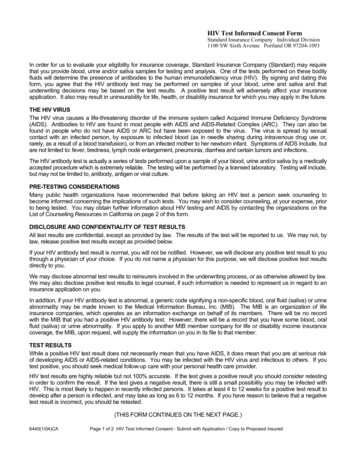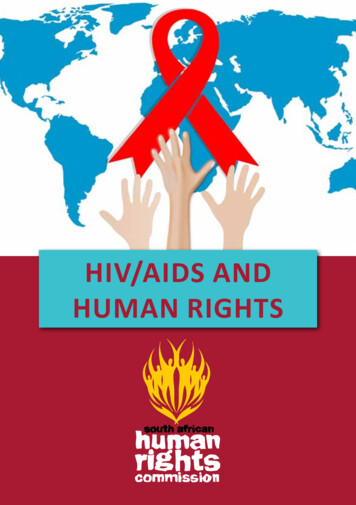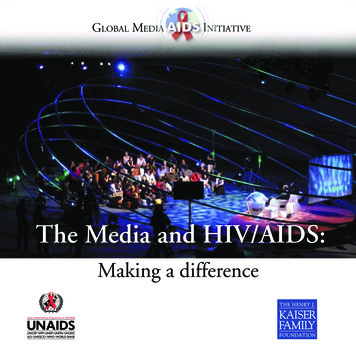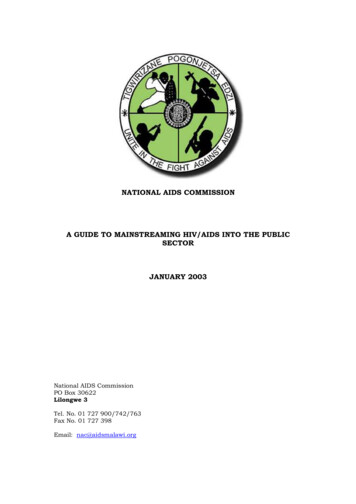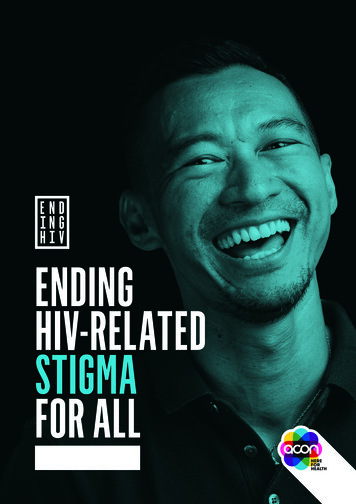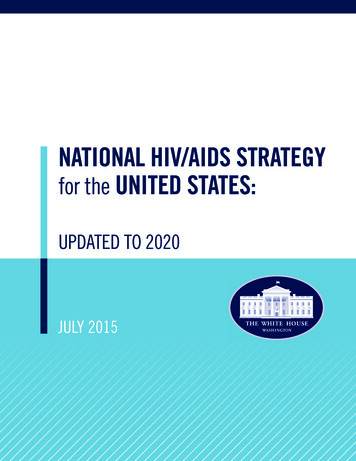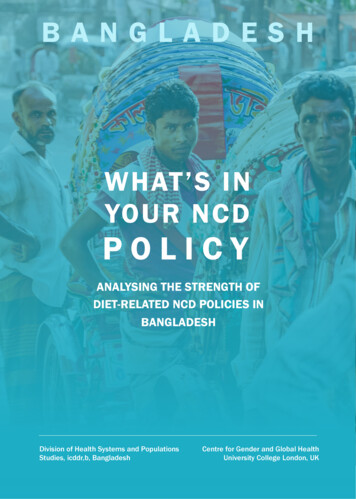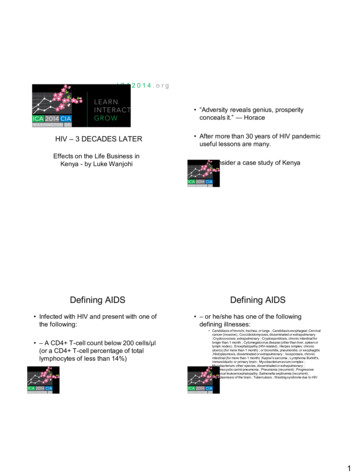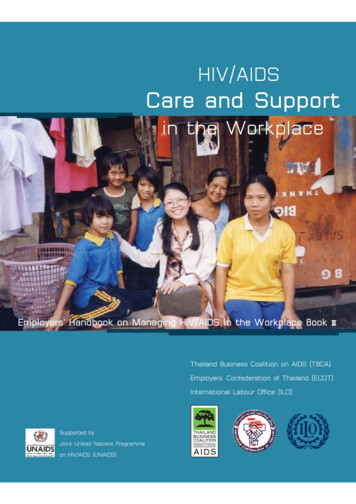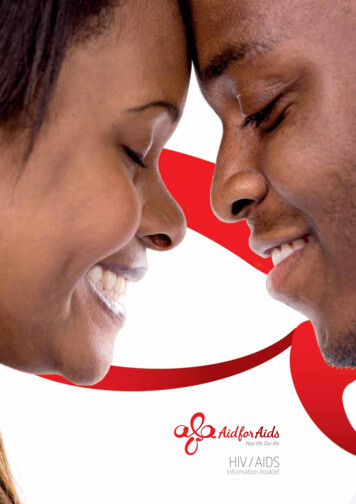
Transcription
HIV/AIDSInformation booklet
ContentIntroduction1What is HIV/AIDS2How is HIV spread?4Symptoms of HIV infection7Testing for HIV8Preventing the spread of HIV10Sexually Transmitted Infections (STIs)11Condoms12Living with HIV/Aids13HIV Medicines/Antiretroviral Therapy (ART)14The Aid for AIDS programme17Contact details20Copyright Aid for AIDS (Pty) Ltd 2005No part of this book may be reproduced or transmitted in any form or by any means,electronic or mechanical, including photocopying, recording or by any informationstorage or retrieval system without prior permission in writing from the Aid for AIDSprogramme.Copies may be obtained free of charge from:AfA programmePO Box 38597Pinelands, 7430South AfricaTel: 0860 100 646 27 21 466 1700
IntroductionHIV/AIDS was first identified in the early1980’s. Since then the number of peopleinfected with HIV has increased rapidlythroughout the world. HIV/AIDS has becomethe most widely talked about condition inhistory. However, each day more and morepeople are becoming infected.We do not use what we know is right toprotect ourselves from infection with thevirus. To make matters worse, many peopleare infected with HIV, yet do not have an HIVtest to find out their status so they can gethelp and support.The key is information and action. The firststep is to find out whether you are living withHIV or not. If you are living with HIV, you canget information about how to stay healthy aswell as how to protect yourself and your lovedones. If you are not living with HIV, you can getinformation about how to remain that way.There are many wrong ideas about HIV/AIDS.Many individuals believe HIV does not exist,condoms do not work, that only certain peopleare at risk of HIV infection, that HIV cannot betreated, that there is a cure or that you canbecome infected through food, water, toilets,showers and pools etc. This booklet aims tohelp you understand HIV/AIDS more clearly byanswering some of the questions that you mayhave and provide you with information onHIV/AIDS as well as the Aid for AIDS programmethat is available to members living with HIV ofcontracted medical schemes and companies.If left untreated, HIV can progress to aserious, disabling disease, however todaythere are many treatments available toensure a long and healthy life. HIV/AIDScan be treated and there is a lot that canbe done to improve you health if diagnosedearly. Medications can reduce the virus whilevitamins, good nutrition, and exercise canplay a critical role in keeping your bodystrong and healthy.“ The key is:Information and action”1
What is HIV & AIDS?What is HIV?HIV (Human Immuno Deficiency Virus) is avirus that enters blood. In HIV positive people,the virus can be found in the blood, sex fluids(such as sperm and vaginal fluids) and breastmilk. HIV is too small to see with the eye.What does HIV do?HIV attacks and eventually destroys thebody’s immune system. The immune systemis like your body’s army. It normally fightsgerms, infections, bacteria and viruses thatwould make you sick. The body cannot defenditself against germs, infections, bacteria andviruses when this “army” gets weak.What is AIDS?HIV causes AIDS (Acquired Immuno DeficiencySyndrome). HIV slowly damages the immunesystem (the army) if it gets into a person’sbody. This means that the body starts to loseits ability to defend itself against germs,infections and bacteria such as TB.When the immune system is weak, youare susceptible to certain illnesses like2pneumonia and TB. This process may takemany years to happen. You are then said tohave AIDS. A person gets sick when HIV hasdestroyed most of his/her immune system.This can take many years to happen.Many people believe that HIV/AIDS is not real.They think that it is a story to scare people touse condoms and stop having sex. However,many people have HIV in their bodies and manyhave already died of an AIDS-related sickness.What will AIDS do?A person living with AIDS becomes very weakand can get sick from many different germs.These germs can cause problems such aslosing weight, bad diarrhoea, sores in themouth, cough, pneumonia, TB, brain and nervedisease, swellings, fevers and sores. Thesedo not get better on their own because ofa deficiency in the immune system. Takingmedication can help you to become better.“ Find out about medicationto treat HIV”
“ The more youknow, thebetter”3
How is HIV spread?HIV is spread in the following ways:1. Sexual intercourseHIV can be found in the semen and vaginalfluids of a person who is HIV positive. Heor she can pass HIV onto another personthrough unprotected sex (not using acondom) vaginal, oral or anal sex.2. PregnancyHIV may be passed onto a baby from an HIVpositive mother. Not all HIV positive mothersgive birth to babies that are HIV positive. Therisk of passing on HIV to the babies increases ifthe mother is sick with an AIDS illness or if themother gets infected with HIV during pregnancy.HIV can be passed to the baby during: The pregnancy At the time of delivery In breast milkMany women only find out they have HIVwhen they fall pregnant. By this time theunborn child is at risk of getting HIV. Thechances of HIV passing from mother to childare between 20 and 40% during pregnancyand at the time of delivery. The risk ofinfection increases if the mother breast feeds.There are now medicines available to helpreduce the spread of HIV to the baby.3. BloodHIV can pass from one person to anotherthrough his or her blood. Sometimes sick4people are given extra blood through a bloodtransfusion. In South Africa blood transfusionsare safe because blood is tested before it isgiven to sick people.HIV can be passed on in very small amountsof blood, for example when people sharerazor blades which are not cleaned properly.HIV can also be passed on by injecting drugsand sharing needles.People most at risk of this happening are: Injecting drug users Doctors and nurses treating patients with HIVHIV can also be passed on when handlingblood without gloves, e.g. after an accident,as this blood may contain the HIV germ thatcould enter through cuts and open wounds.“ Speak to Aid for AIDS oryour local health worker”Are there any other ways I can get HIV?HIV is mainly spread through unprotectedblood and receiving blood infected with thevirus. It can also be spread during pregnancy,birth and breast-feeding.
Doctors agree that you cannotget HIV from: Eating food prepared by someone with HIV Sharing cups, mugs, plates, food, spoons,forks, etc Doorhandles or rails Sneezing or coughing Tears or saliva Toilet seats Holding or shaking hands Mosquitoes Swimming pools or baths Working or attending school with someonewho is HIV positive Donating blood Living with someone who has HIV Being next to or close to someone who has HIV Kissing, hugging or touchingWho can become infected?Some people think that HIV/AIDS is a diseasethat only affects certain people. HIV/AIDSaffects everyone, no matter what age group,race, gender, religion, faith, culture, nationality orsexuality. If you have been exposed to HIV, thereis a chance that you have become infected.“ The only way toknow if you have HIVis to have an HIV test”5
6
Symptoms of HIV infectionWhat are the symptoms of HIV infection?Within a month or two of getting infectedwith HIV, many people (but not all) candevelop flu-like symptoms, swollen glandsor a rash. These symptoms usually go awaywithin a couple of weeks, and a person canlook and feel well for many years before thesymptoms come back.This period when you look and feel well canlast five to seven years or longer in adultsand two to five years or longer in childrenborn with HIV. As HIV continues to attack theimmune system, the illnesses start to showagain.What will happen when someone withHIV gets sick?It can take many years for HIV to make yousick. When you start to feel sick because ofserious infections, it means that you mayhave AIDS.thrush (a white rash inside the mouth or onthe private parts), swelling in the neck, behindthe ear, under the arm and in the groin.Signs and symptoms of TB include coughs,sweating and weight loss, fevers and sweatingat night, as well as enlarged glands.“ The sooner you are tested,the better”Later signs of AIDSYou can also develop any of the followingproblems when you get very sick with AIDS:TB, bad cough and fever (pneumonia), ‘pinsand needles’ and pains in the hands andfeet, diarrhoea that does not stop, weaknessand tiredness, tumours on the skin, losingweight, headaches, seizure, black-outs, lossof memory, difficulty in concentrating anddifficulty in swallowing.Some early signs include: painful skin rashes(shingles), sores on the lips which do not heal,7
Testing for HIVHow will I know that I have HIV?How do I have an HIV test?You can look and feel healthy for years whenyou first have HIV in your body. There is onlyone way to find out whether you are living withHIV - by having an HIV test.Should I have an HIV test?You should go to a clinic if you are thinkingabout having an HIV test. The health workershould sit down and talk to you about thetest. You can decide whether or not to havethe test. No one can force you to have an HIVtest – it is your choice.Finding out as early as possible after beinginfected with HIV is important. This way youcan get help and avoid spreading HIV withoutknowing it.If you decide to test, the health worker willtake a blood or saliva (spit) sample. This will bechecked for HIV antibodies, which are made bythe immune system soon after you are infected.Why must I have an HIV test?Some of the tests will give the results within afew minutes, but other tests need to be sentaway to get the results. If your test has beensent away you will need to visit the healthworker about one week later to get the result.If antibodies are found you have a ‘positivetest’ and are infected with HIV. Knowing the result can reduce the stressand uncertainty of not knowing. Your doctor or clinic will be able to tellyou if worrying signs and symptoms areHIV/AIDS-related. There is help available to you if you are HIVpositive, one being through Aid for AIDS.Contact them on 0860 100 646 for moreinformation. You cannot lose your job just because youare HIV positive – there are laws to protectyou. You can change your lifestyle to protectsexual partners from future infections, sothat you do not infect your sexual partnerwith the virus without knowing. Decisions about having children or enteringinto new relationships can be considered. A lot can be done to help you lead ahealthy, normal life and slow down thetime to developing AIDS if HIV is foundearly (before getting sick) in your blood. If you are HIV positive and register withAid for AIDS, approval can be providedfor multivitamins and preventativevaccinations to help you remain healthy.8This is why people living with HIV are oftencalled ‘HIV positive’.What are my rights?You have to decide whether to go for the test.Nobody, not even a doctor or your employer,has the right to force you to have the testwithout your permission. The test result isconfidential. It is against the law for thehealth worker to tell someone else the resultwithout your permission. It is important thatthe health worker explains the meaning of thetest to you so you can decide if you want it.“ Aid for AIDS can help youlead a healthy, normal life”
Should I have counselling whengoing for an HIV test?infected with HIV. HIV can also be passed onduring breast-feeding.Taking an HIV test is very personal and thetest result can be difficult to handle. It isimportant to get counselling to prepareyourself for the test result. Try a localcounselling centre, or your local ATICC (AIDSTraining, Information and Counselling Centre),if you do not know where to find one.The test cannot tell when you got theinfection or when you will get sick.The Aid for AIDS number is 0860 100 646and all calls are confidential.What if my HIV test is positive? You are infected with HIV. You can spread it to your sexual partners ifyou have unsafe sex. You must always use a condom if youhave sex. It is important to tell sexual partners thatyou are HIV positive. Discuss this with acounsellor or health worker. You must not donate blood.Pregnant women who are HIV positive mayinfect their babies. Not all babies will beWhat if the HIV test is negative? No HIV has been detected in your blood. You may not have HIV if the test isnegative.However, it may be necessary to test again.You could be in the ‘window period’, whichis the time between when you are infectedwith HIV and the tests used by doctors andclinics become positive. This is usually twoto four weeks.“ If you are HIV negative,keep yourself safe fromHIV in the future.The keyis to stay negative!”9
Preventing the spread of HIVHow do I stop myself from being infected with HIV?“ There is no cure for HIV. Once a personhas HIV, they will remain infected for therest of their life. Therefore preventingthe spread is the most important way ofcontrolling HIV.”The following actions will prevent the spread of HIV: Protected sex – with a condom, used correctly. Sex without penetration – this is when a man’s penis does not enterthe woman’s vagina or anus. This is also safe sex. Sex can be a wayof showing love but not the only way. You can also show love bykissing, touching and holding each other. You can have sexual climax without penetration by rubbing theperson’s private parts with hands or fingers. It is important to reduce the number of different sexual partners. New relationships – you should use a condom. Both of you should gofor an HIV test before you stop using condoms. It is safe to have sexwithout protection if both HIV tests are negative. This means you areboth free of HIV. Remember that both partners must stay in a sexually faithfulrelationship with only each other, otherwise the sex will no longer besafe. This is a faithful relationship.10
Sexually transmitted infectionsHow do I get my partner to agree to haveprotected sex?One of the reasons why HIV is spreading sofast is that many people do not want to talkabout sex. The key here is communication. Youshould have open discussions about having anHIV test, using condoms, being faithful and thedangers of unsafe sex. Discussion about sex andrelationships with your partner needs to happenif you are going to protect yourself from HIV.If you are unsure of how to deal with this,contact the National AIDS Helpline, yourlocal ATICC (AIDS, Training, Information andCounselling Centre) or Aid for AIDS.STIs can be very dangerous and can causebad infections and HIV can get into your bodyand blood more easily through broken skin ifyou already have an STI. This means that HIVcan be spread from one person to anothermore easily.How do I know if I have a SexuallyTransmitted Infection?You may have the following problems:“ Have open talks withyour partner” Sores on your genitals or anus White, yellow or green discharge from yourpenis or vagina Pain in the lower stomach Burning or pain when going to the toilet Itching or redness around the private parts Painful sex Pain in the testicles Swelling in the groinI’ve heard that Sexually TransmittedInfections can increase the chance ofinfection?It is important that you have an STI treated.Clinics and doctors can treat STIs with tabletsor with an injection. Treatment of STIs usuallyworks quickly.Sexually Transmitted Infections (STIs) areany sickness passed on from one person toanother during sex. Gonorrhoea, the drop,syphilis and herpes are STIs.“ STIs are passed on duringunprotected sex”A person with an STI may have a discharge orsores on his or her private parts. This makesit easier for the HIV to get into blood and thebody during sex.11
Condoms“ Condoms are the most important wayof preventing the spread of HIV”The correct method of using a male condom: Use a new condom every time you havevaginal, anal or oral sex. Before using the condom make sure it hasnot expired and that it is not damaged. Handle the condom carefully. Don’t tear itwith your finger nails or teeth. Unroll the condom a little on your finger tosee which way it will unroll. Before sex begins, put a condom onto yourhard penis. Pull the foreskin down first ifyou are not circumcised. Before putting on the condom, squeeze thetip so no air is trapped. Roll the condom down over your penis so thatthe whole penis is covered with the condom.Right way upSqueeze condom tipUnroll fully Use water-based lubricants only (e.g. KYjelly) as oil-based lubricants, like Vaselinepetroleum jelly, will weaken the condom. After sex, pull the penis out of your partnerbefore it gets soft. Hold the bottom of thecondom tightly so that it doesn’t slip off. Carefully take the condom off your penisBe careful not to let any fluid leak fromthe condom. Tie the condom and throw it away. Put itinside some paper first, if you can. Do not wash or reuse the condom. If the condom breaks during sex, withdrawthe penis immediately.Hold base when withdrawingFacts about condomsDon’t use things like plastic bags if you can’tget a condom. They are dangerous.Only use one condom at a time otherwisethey will both rip.Condoms are one of the most important waysto prevent the spread of HIV, if used correctly.12The condom may fail in preventing STI andHIV transmission if: It is torn It slips off during sexual contact It is not put onto the penis correctly, or it isnot put on before sexual contact beginsBoth male and female condoms (femidoms)are available.
Living with HIV/AIDS“Stay healthy!”I have heard that you cannot treat peoplewho have HIV or AIDS? What should I do tostay healthy if I am HIV positive?Although there is no cure for HIV, there is alot that can be done to lead a healthy and‘normal’ life. Good medical care and hygienecan do a lot to keep people well for a longtime and lengthen the time before you getsick and develop AIDS. Register on the Aid for AIDS programme ifyou are a member of a contracted medicalscheme or company (they are there toassist you). Contact the programme on0860 100 646. Stay working and active for as long aspossible. Have protected or safe sex (correctly usinga condom). Visit the doctor or hospital for regularcheck ups. Eat good food and stay strong for as longas possible.Improve your lifestyle by keeping healthy,including: Exercise regularly. Eat a healthy balanced diet (vegetables,beans, eggs and fruit). Stop smoking and avoid alcohol. (Thesethings make your body weak so it iseasier for HIV to get strong and you toget AIDS earlier.) Medication can help slow down HIV, thedisease and to prevent illnesses. Get enough rest and reduce stress levels. Take multivitamins. Drink lots of water.13
HIV medicines/AntiretroviralTherapy (ART)What medicines can I take to preventillnesses?Medicines can be used to prevent illnessesthat you can get when you have HIV. Thesemedicines are known as vaccinations andprophylaxis (prevention). It is important thatyou see your doctor regularly so illnesses canbe found and treated.What about medicines to attack the virus?New medicines can help slow downthe disease. These medicines are called‘antiretrovirals’ and, if taken correctly, canreduce the amount of HIV in the blood. Whenseveral of these drugs are used together, theyare more effective and allow the immunesystem to heal. This means it will take longerfor a person with HIV to get AIDS and will helpkeep them out of hospital.Although there is no cure for HIV, thereare medicines available that treat HIV veryeffectively. There are other illnesses whichcan also be treated and not cured, like sugardiabetes or high blood pressure. HIV shouldbe seen as another chronic treatable illness.It is not necessary to start taking HIVmedicines as soon as you find out that youare HIV positive. A lot of people with HIVremain healthy and well for a long timewithout treatment.When HIV gets into your body, it attacks yourimmune system. The immune system willbecome weaker and weaker and eventuallywon’t be able to fight off any other infections.It can take a number of years before theimmune system is this weak.14CD4 counts and viral loadsYour doctor will measure your CD4 count(the health of your immune system) and viralload (the amount of virus in your blood) todetermine the stage of the disease which youare at and to help decide on the best time tostart treatment. Once your immune system isweak or if you are having serious symptoms,it is necessary to start taking HIV medicines.AntiretroviralsThe medicines which are used to treat HIV arecalled antiretrovirals (ART). There are threedifferent classes of antiretroviral medicines.Your doctor will usually use three medicinesfrom two different classes to treat your HIV.The medicines do not get rid of HIV, but theylower the amount of HIV in your blood andthe HIV is therefore not able to do as muchdamage to the immune system.Antiretroviral therapy has the followingbenefits: The medicines will increase the length ofyour life. The medicines will improve the quality ofyour life. The medicines will reduce the chance ofyou getting nasty infections because yourimmune system is too weak too fight offthe infections. The medicines will boost your CD4 countand make your immune system stronger. The medicines will reduce your viral load.Less virus in the blood means less damageto the immune system.
“ Once you are on antiretroviral medicines, your doctorwill do blood tests to make sure that the medicines areboosting the CD4 count and decreasing the viral load. It isvery important to go back to your doctor for these tests”Taking your medicines correctlyFor antiretrovirals to work properly it is veryimportant that they are taken correctly. Youmust remember to take every dose of yourmedicines every day. If you miss medicines,the HIV will become resistant to thatmedicine and your treatment will have to bechanged. (Drug resistance can occur if youdon’t take your medicines properly, they willwork less well against your virus). As thereare several different classes of antiretrovirals,it is possible to change a few medicines, buttreatment can become difficult if the patientis resistant to a lot of different medicines. Youtherefore need to aim to take your medicinesexactly as prescribed by your doctor. Startingantiretroviral treatment is a big decision anddoes require a lot of commitment. If you arenot sure that you are ready to cope withtreatment, you should discuss this openlywith your doctor as it may be better to wait alittle longer before starting treatment.Changing medicinesIt is sometimes necessary to make changes toyour treatment. Some of the antiretrovirals maynot ‘agree’ with you and you may experienceside effects. If any of your medicines aremaking you feel unwell, you should discussthis with your doctor. If the side effect is nottoo severe, your doctor may encourage youto continue taking the medicines. The sideeffect may get better (or disappear altogether)after you have been on the medicine for alittle while. In some cases it may be necessaryfor your doctor to change you to a differentantiretroviral because of side effects.Your doctor will also do certain blood teststo check if the medicines are having any badeffects on your body. Your doctor will tellyou when to come back for blood tests. Itis very important to go back to your doctorregularly for these tests so that any sideeffects can be picked up quickly. It may alsobecome necessary to change your medicinesbecause the HIV has become resistant to themedicines (this can happen even if you aretaking the medicines correctly). Your doctorwill then change all of your medicine.15
HIV negative babiesAn HIV positive mother can pass HIV on to her baby during pregnancy,whilst giving birth or by breastfeeding her baby. It is possible toprevent a baby from being born with HIV by treating the mother withantiretrovirals during her pregnancy. The mother is usually givenmedicines for the last few months of her pregnancy and the baby isgiven medicines for the first few weeks of life. The recommendation isto either breastfeed exclusively or bottle feed.Exposure to HIVIf you are HIV negative and you come into contact with HIV (forexample, if you are raped or prick yourself with a needle with HIVpositive blood on it), you can reduce your chances of becominginfected by taking antiretrovirals for a short while after the incident.You need to start taking the antiretrovirals as soon after the exposureas possible. Please contact your doctor immediately if you think thatyou have been exposed to HIV.If you would like to talk to someone about HIV/AIDS or HIV medicines,please contact your doctor or Aid for AIDS for advice. The Aid for AIDSsupport service is available Monday to Friday between 8:30am and4:00pm on the telephone number: 0860 100 646.Some people say they have a ‘cure’ for HIV/AIDS, is this true?There is no cure for HIV at this stage, but it can be treated verywell if found early. Other health conditions like diabetes, asthma orhypertension can also be controlled but not cured.16
The Aid for AIDS programmeWhat is available to me through my medicalscheme or company programme?It is important that you take your medicinesregularly and do not skip doses. Somepeople feel ill when they first start taking themedicines, BUT THIS WILL GET BETTER asyour body gets stronger.Once you start these medicines, you willtake them for the rest of your life. However,your Antiretroviral therapy (ART) may bechanged or temporarily stopped due to sideeffects or possible failure of the medicines.The use of ART in the case of mother to childtransmission and in the case of rape andoccupational exposure is short term.Antiretroviral medicines may be given topregnant women who are HIV positive, and totheir baby after birth. This is to prevent thebaby from getting HIV.Aid for AIDS is available to members ofcontracted medical schemes and companiesand offers members and dependantsaccess to: Medicines to treat HIV, includingAntiretroviral therapy (including drugsto prevent mother-to-child transmissionand after rape or needlestick injury) andmultivitamins. Treatment to prevent opportunisticinfections like certain serious pneumoniasand TB. Regular monitoring of disease progressionand response to therapy. Ongoing patient support via a TreatmentSupport Line. Clinical guidelines and telephonic supportfor providers. Assistance in finding a registered counsellorfor emotional support.HIV positive members of contracted medicalschemes and companies are able to accessthese medicines through the Aid for AIDSprogramme.For further information, please contact Aid forAIDS on 0860 100 646.17
The Aid for AIDS programmeWhat does Aid for AIDS offer me if Iregister?A lot of progress has been made in HIV/AIDStreatment. The earlier a person knows theyhave HIV, the sooner they can get help. Byjoining Aid for AIDS, members will benefit from:MedicationAid for AIDS authorises payment ofAntiretroviral drugs (HIV/AIDS drugs)and other medicines to treat HIV/AIDS. Ifmembers are HIV positive and register onAid for AIDS, approval can also be providedfor multivitamins. All medical schemes givean extra amount, in addition to the usualmedicine benefits, to cover these drugs.However, patients must register on Aid forAIDS to access this benefit.Regular examinations and testsAid for AIDS reminds the patient to go forregular examinations and tests. This helpstheir doctor monitor their health. If changesto treatment are needed, the patient’s doctorcan simply contact Aid for AIDS for anynecessary authorisation.See your doctor regularlyVaccinationsAid for AIDS authorises payment ofvaccinations to protect against illnesses likeflu. These illnesses affect people with HIVfar more badly than a person who is healthy,especially if their immune system is veryweak. Remember that HIV breaks down theimmune system over time.18CounsellingPatients need help to deal with emotions anddifficulties that come from being infected andliving with HIV. Aid for AIDS therefore advisespatients and their families to seek supportfrom a registered counsellor who can helpthem cope. Aid for AIDS has a list of variouscounsellors and support groups in SouthAfrica, and will gladly provide this informationto its members.Ongoing monitoring and personal supportThe Aid for AIDS team is specially trained andwill work with the patient’s doctor to ensure themost appropriate and cost – effective treatment.Clinical guidelines and ongoing support are alsoavailable for providers on request.“ Get help as soon asyou can”Patients also have access to a TreatmentSupport Line, 0860 100 646, for help with:Administrative queries – how to obtainand complete application forms, as well asclaiming procedures and benefit information.Clinical queries – questions about HIV-relatedillnesses, drugs and special investigations.Clinics and support services – advice onclinics and available support groups.
How do I join Aid for AIDS ?Step OneIf you are worried that you might be infectedwith HIV, ask your doctor or clinic to test you.This test will be paid for and only you andyour doctor will be informed of the results.Step TwoIf the results show that you are HIV-positive,call AfA on 0860 100 646 and ask for anapplication form.Step ThreeYour doctor will examine you and helpcomplete the form. Your doctor will be paidfor completing the form.Step FourFax your completed form to AfA on our tollfree number: 0800 600 773.Step FiveThe AfA medical team is specially trained toreview your medical details. They will contactyour doctor if necessary, and agree on themost appropriate treatment for you.Step SixYou will need to visit your doctor for regularexaminations and tests.Step SevenYour doctor will contact AfA to keep usinformed about your condition. If necessary,your treatment plan will be updated.Step EightIf you are a medical aid member, submit your HIVclaims in the same manner as you wou
treated, that there is a cure or that you can become infected through food, water, toilets, showers and pools etc. This booklet aims to help you understand HIV/AIDS more clearly by answering some of the questions that you may have and provide you with information on HIV/AIDS as well as the Aid for AIDS programme

